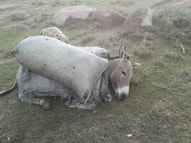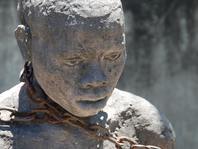weekly column
|
Each week, find a commentary on something connected to verses of Torah or another source of wisdom
|
|
Each week, find a commentary on something connected to verses of Torah or another source of wisdom
|
 The Exodus:5 Project He designated some young men among the Israelites, and they offered burnt offerings and sacrificed bulls as offerings of well-being to the LORD. Exodus 24:5 I have been through a lot of changes in my life over the last five years, most of them unexpected, and I cannot help but look backward to try to identify the trajectories that landed me where I am today. I know that I have worked very hard at maintaining a consistency between my personal life and my public life, heeding the admonition of one of my beloved teachers, Rabbi Yaakov Rosenberg, of blessed memory. I remember him asking a group of rabbinical students about a particularly troublesome bit of liturgy that is often sung with gusto. When most of us sheepishly acknowledged we did not subscribe to the theology behind it, Rabbi Rosenberg, generally a most affable man, let a dark look come over his face and said to us, “Never say anything you do not believe. Ever.” My credibility as a person, never mind as a rabbi, has always had to answer to this internal standard. I am not being glib when I say that what I believe is not always true, nor that what I once believed has evolved in different ways during the course of a lifetime. But it’s pretty rare when I say or do something that does not reflect my principles. The imposing presence of “Yonk” Rosenberg is always asking me if I believe it. In no realm of my life is this truer than Shabbat. I have been a pretty diligent sabbath-observer since I was in my early twenties, and only slightly less strict before that. The nature of my diligence has changed over the years, but some things are no different than they were in 1974: I don’t write; I don’t drive; I don’t spend money; I don’t cook. The exceptions have been few and far between, mostly involving medical emergencies. I believe in the central importance of Shabbat to Jewish life. I go to a lot of trouble to preserve that commitment, and I pass up a lot of opportunities that ask me to compromise. This past week was one of those rare moments when what I believe came into conflict with what I believe. I have allowed others to gather without me for rallies, vigils and marches on Saturdays all of my adult life. I support the causes, but others were able to give voice to my concerns. I have sent plenty of messages of solidarity and encouragement to partners and allies while staying home awaiting news of their great success. (Last year, on the day of the Women’s March, I was able to participate in a sister march in San Juan because it took place outside of our vacation hotel; we were among the fifty or so who gathered to hear an earnest speaker exhort us to activism.) But for the first time, I was asked by children to support them as they pleaded to be guaranteed the very first unalienable human right that forms the foundation of this country: life. And they were gathering too far away from my home for me to walk. At my age, I can’t sleep in a sleeping bag on a floor. And, never mind why, it just was not possible for me to make my way through this long Shabbat in a hotel. I had two tasks. I was invited by an unlikely friend to bless the leaders of the program before it began. And my organization was participating in giving away 5000 lunches to participants. So, I found a way to rationalize one thing I believe over another. Even though neither of my tasks worked out exactly as I understood, I was satisfied that I decided correctly. I was one of the many hundreds of thousands who sacrificed at least as much as I did to stand in solidarity. I came for the kids. I came because before my commitments to Shabbat were so well-formed, I was among the children asking for support in a plea to save our lives and others’. I was conscious then of who did not show up. I believed they should have followed the lead of the generation desperate to live a better life than they had been offered. I still believe it. So I had to show it when I stood on the other side of the equation. The exhortations to uphold the covenant – including Shabbat – were made by Moses who was at least eighty years old at the time. He gathered seventy elders around him to pronounce lofty expectations of justice, compassion and personal integrity. It was all very impressive. But when it came time for the people to make their promise, it was the young people who stood before the people. The gathered Israelites had to look them in the face and guarantee them that the words they spoke were words they believed. They were to be held accountable not only by God and not only by Moses, but also by their children. If they loved those children and the ones who would come after, then they could never say anything they did not believe. Ever. Without that kind of integrity, promises of diligence in devotion were just self-serving and prideful. One of the speakers, it turned out, was someone I did bless at the beginning of her young life. I held her in my arms and asked God to bless and keep her and to give her peace. She showed up to demand that we make good on that blessing so joyfully and casually conveyed. Rabbi Rosenberg was not on my mind on that day all her life ago. I was not on her mind when she spoke to as many people as Moses addressed in the wilderness. If you are reading this not as a Shabbat observer (by whatever definition), you don’t have a sense of what this decision meant to me. If you are indeed a Shabbat-observer who would make a different decision in these circumstances, you also do not know what this decision meant to me. The fact is, I was both of you at different points in my life. And independent of why I decided one way this time and another way a different time, at this particular moment, I am certain that this day itself would not have held the place in my soul had I not been commissioned by Rabbi Yaakov Rosenberg, of blessed memory, never to say anything I didn’t believe. Ever.
0 Comments
 The Exodus:5 Project When you see the ass of your enemy lying under its burden and would refrain from raising it, you must nevertheless raise it with him. Exodus 23:5 Some years ago an earthquake struck Iran with devastating results. That’s not an unusual occurrence, but this time it was in the midst of some more extreme antagonism toward the West than had become customary. Lots of people were suffering; everything had fallen down. The world’s nations rushed forward with offers of aid. Iran announced that they would gratefully accept all assistance, except from Israel. I remember thinking some unkind thoughts about the Iranian government at that time. I believe my sentiments leaned toward a profane and physically impossible act of intimacy. Your people are dying and you are willing to turn down the help of the most skilled team of emergency responders in the world? Shortly thereafter, an appeal landed in my inbox from an American Jewish organization dedicated to service around the world. The CEO made an appeal for relief funds to send teams to Iran to aid the victims of the earthquake. The request was well-documented and very much in line with the mission of the organization, which I had been supporting. But I was stunned. What was a Jewish organization doing supporting relief efforts for a country that, in its greatest hour of need, put hatred of Jews over the lives of its citizens? I wrote to the CEO and made my case, expressing my admiration for the remarkable work that had been done turning this organization around from underperformance to leadership, but suggesting that this time they had gotten it wrong. I received a thoughtful reply – nowhere near my impolite thoughts about the Iranian government. In it, the CEO expressed the hope that I would eventually come around to a different point of view, especially since the Israelis themselves went to Iran to do relief work anyway, but under a different flag. I remembered that interaction when I was asked to contribute to relief supplies for children in Iraq during the American blockade that was part of the Gulf War. A young activist pressed me hard to contribute funds that would, as he put it, feed the starving children of Baghdad. The funds available to me at the time were modest, and there were other demands on them. Again, I declined. I was troubled by the notion of giving aid and comfort to an enemy of the United States. His reaction was that children are not our enemies. People in conflict place an enormous burden on those around them. It does not matter if the conflict is across national borders or across the backyard fence. When suffering befalls those who are not party to the conflict – civilians, children, beasts of burden – whether it is the result of the conflict or merely the circumstances of life, making a decision to help lift the fallen of my enemy carries with it the concern that I may be participating in my own disadvantage or defeat. My concern for myself and those dear to me restrains me from reaching out to those in need who, in better circumstances, would immediately receive my support. The verse that begins this column is a sly reprimand to people like me and promotes a psychological ploy long before the invention of psychology. My enemy has overburdened his ass; well, what do you expect from a guy like that? And the animal collapsed under the weight? That’s not my problem. But the expectation is that I will not permit this innocent beast to serve as the surrogate for my antipathy toward its owner. In fact, I must show my enemy what a great guy I am by working with him to lift the beast. Having accomplished a righteous act together, we have the accidental basis of a mended relationship. I was fortunate to have another opportunity to see this idea in action. When the Carmel Forest caught fire in Israel, assistance came pouring in from all over the world, including those technically at war with Israel. The trees bore no more responsibility for conflict than the aforementioned donkey. This time, a little older and wiser, I had a better reaction. With a friend and colleague, I visited the embassy of every country and entity that pitched in to stop the fire. We presented a certificate of appreciation – a tree, planted in their honor, and an invitation to come see it grow.  The Exodus:5 Project When a fire is started and spreads to thorns, so that stacked, standing, or growing grain is consumed, he who started the fire must make restitution. Exodus 22:5 The Law of Unintended Consequences is, as one pundit said, often invoked but rarely defined. Mostly, it is meant to refer to government regulations. They are often well-intended, but they never work exactly the way those good intentions hoped. In my current line of work, the best illustration is the Religious Freedom Restoration Act. Almost 25 years ago, a remarkable coalition of religious activists from across the spectrum collaborated on developing a piece of federal legislation to protect practitioners of minority religions. (Of course, 25 years ago everyone other than Christians were religious minorities.) The origin of the effort was the arrest of a Native American practitioner of his legacy tradition, which included the ingestion of peyote as a sacrament. Never mind the details. When the dust cleared and the lower courts had their say, RFRA (say “riff-rah,” like Scooby-Doo) protected the rights of Jews to wear kippot, Muslims to pray five times a day, Sikhs to wear the symbolic kirpan and lots of other people to incorporate their observances in ways that did not substantially burden government, employers and other official rule-makers. RFRA passed almost unanimously in both houses of Congress and, a few years later, was declared unconstitutional by the Supreme Court except in very limited circumstances. The Court did not restrict the authority of individual states to enact their own RFRAs, and many did in pretty short order, using the model of the federal legislation. The provisions in the original RFRA are still pretty much intact in my own state, Virginia. It sounds like a pretty good idea, right? There may be good cause for salespeople in a clothing store to look presentable, but a Muslim woman who covers her hair in modesty does not compromise that standard (as Abercrombie and Fitch discovered). Food service workers must maintain a regulated level of hygiene, but that is possible for Sikh men who go unshorn. A Shabbat-observant employee may elect to use earned time off to leave work soon enough to be home before sundown Friday. (A nod to my secular coalition partners: sometimes accommodations for religious practice, however sensitively construed, disadvantage those who are not at all religious. As my friend Nick says, if I have tickets for college football games, why must I always work Saturdays to allow for someone to observe their sabbath?) It took twenty years, but the Law of Unintended Consequences has set the field of religious freedom on fire. It took a while, but the people least effected by RFRA found a way to weaponize it on their own behalf. In those states that had not enacted their own protections for religious minorities back in the day, advocates and legislators from the religious right attempted to use the principles of protection to ensconce their own dominance over state law. Using the language of "substantial burden," opponents of marriage equality took the Supreme Court's expanded definition of "person" from the Hobby Lobby case to enable individuals, businesses and institutions to refuse to validate same-sex marriages by providing gays and lesbians with goods and services that straight people could access. They could claim that such actions would substantially burden them on religious grounds. The Governor of Indiana at the time was former U.S. Representative Mike Pence, lately Vice-President of the United States. He signed the bill into law. At that point, the fields of Indiana with their corn and amber waves of grain burst into flames. Companies from Angie's List to Eli Lilly to both the NBA and the WNBA threatened to turn their objections into relocations. Investors in Indiana businesses announced they would invest elsewhere. Major cities and universities announced that they would do everything to make their residents and communities feel fully welcome and integrated. Within nine months, the Indiana legislature rolled back most (but not all) of the legislation. Gov. Pence signed that legislation as well. RFRA, once hailed as a great equalizer, is now widely criticized. The debates among former supporters – including some of the architects – are about whether to fix or scrap the law. The manipulation of this law has produced another casualty as well. The notion of religious freedom, once championed by every American with the smallest familiarity with the Constitution, has fallen victim to the culture wars being waged by those unwilling to accept the rule of law over the rule of personal faith. As a kid in the Chicago area, I loved the smell of burning leaves in the fall. Homeowners would rake them into the gutter and light them to dispose of them. They smoldered for a long time, polluting the air and, untended, were dangerous. It's now illegal to burn leaves. One day as I rode my bike home from school, staying to the far right of the street, I wheeled through an innocent-looking small pile of leaves. Suddenly, I had a hot foot. My laces caught on fire. The solution to the problem of one homeowner caused, quite unintentionally, an injury because some guy didn't want to give up the past. Maybe I should have ridden around the pile. Maybe the farmer shouldn't have stacked the grain so close to the thorns. Maybe gay people shouldn't get married. Or maybe persons – however defined – ought not promote what they know are unintended consequences.  The Exodus:5 Project But if the slave declares, “I love my master, and my wife and children: I do not wish to go free,” Exodus 21:5 Under what circumstances do we tolerate slavery? It is pretty clear that the Bible allows for slavery, even if the circumstances of the Israelite slave is far more tolerable than the kinds of slaves who come to mind when we think about American history. Israelite slaves earned wages, received adequate sustenance, kept their families intact, had a day off each week, and were free after seven years. In fact, many Israelites entered this slavery willingly to pay off a debt or to avoid the consequences of poverty. (It is important to note that Canaanite slaves were not the beneficiaries of this somewhat enlightened indentured servitude.) But I am stupefied at the permission given to the slave to continue his life. Maybe I am more influenced by the Young Rascals than the Book of Exodus, but I believe that it is the natural situation for a man (or woman) to be free. Isn’t that what the “exodus” in the “book of” is all about? Were I a rabbi among the original generations of scholars, I would have hoped to be known by this ruling: It is forbidden for a master to treat a slave well enough that he makes the declaration that he does not wish to go free. The master must remind the slave of the degradation of his existence every day. He must restrict the choices available to him, burden him with unpleasant tasks and return no expression of appreciation or affection. In the last year of his servitude, he must say to his slave each day, “When will I be rid of your presence in my life?” Only when he has compensated his slave and declared him free may he apologize and express his gratitude for years of service. Few if any of the slave owners of the American south could be accused of treating their slaves in a manner that inspired appreciation and loyalty. The grueling life of involuntary servitude, considered as personal property, was demeaning and degrading. Whatever dignity was attainable came from within the cohort of slaves who created social conventions and a hierarchy of values to cope with the situation imposed upon them. If, despite their mistreatment, these slaves found compassion and affection for their masters, it can be attributed to a remarkable level of character forged as they rose above the circumstances imposed on their lives. Or, it can be attributed to something else. It is possible for one person (or one group of persons) to impose on another (or many others) injury so deep and grievous that it will not heal. It is possible for a slave to feel gratitude to the abuser who first damaged him beyond repair and then cared for him in his disability. If there is any shame deeper than enslaving a human being, it is in accepting this kind of “love.” The slave who declares, “I love my massa” deprives his master of the possibility of redemption. We hear occasional stories of modern slavery – children imprisoned by parents or kidnappers, victims of domestic abuse deprived of the instinct to flee, foreign nationals “hired” to do work and then kept so poor they cannot escape their employers’ clutches. But most of us know neither slaves nor slaveholders. We are, however, the descendants of slaves and slaveholders alike. The Jews in America, maybe the most abundantly blessed generations of our people in 3500 years of seeking freedom, none the less remember every year (really, every week) that we were slaves. And at least once a year, when reading this section of the Bible, we remember that we had the full permission of our liberating God to enslave other human beings. As Americans, no matter when our ancestors arrived on these shores, we carry that legacy as well. Personally, we bought no African in the market, whipped no belligerent woman, sold no mother’s son to a neighbor, denied no ability to read because of skin color. Personally, we were not the victims of those atrocities. Thank God on both counts. But when we romanticize those times for any reason, we revisit those injuries and demand that the wounds that persist beyond the grave be ignored. We want to hear, “I love my master.” Shame on anyone who gives credibility to the notion of the happy slaves, rescued from deprivation by the generosity of the plantation owner. And likewise, shame on anyone who believes that slavery no longer matters to today’s African Americans in a visceral way. You might as well suggest that Japanese Americans have gotten over the internment camps or Jews have come to terms with the Holocaust. There are parts of the Bible with which a person of faith must struggle. Some of them are seemingly incidental, such as not mixing linen and wool. Some of them have an urgent resonance in our current society, including discussions of gender and sexual identity. And one of them is any level of patience with the verse that validates the statement, “I love my master.” A more grievous delusion never was and never will be. |
Archives
October 2023
Categories |